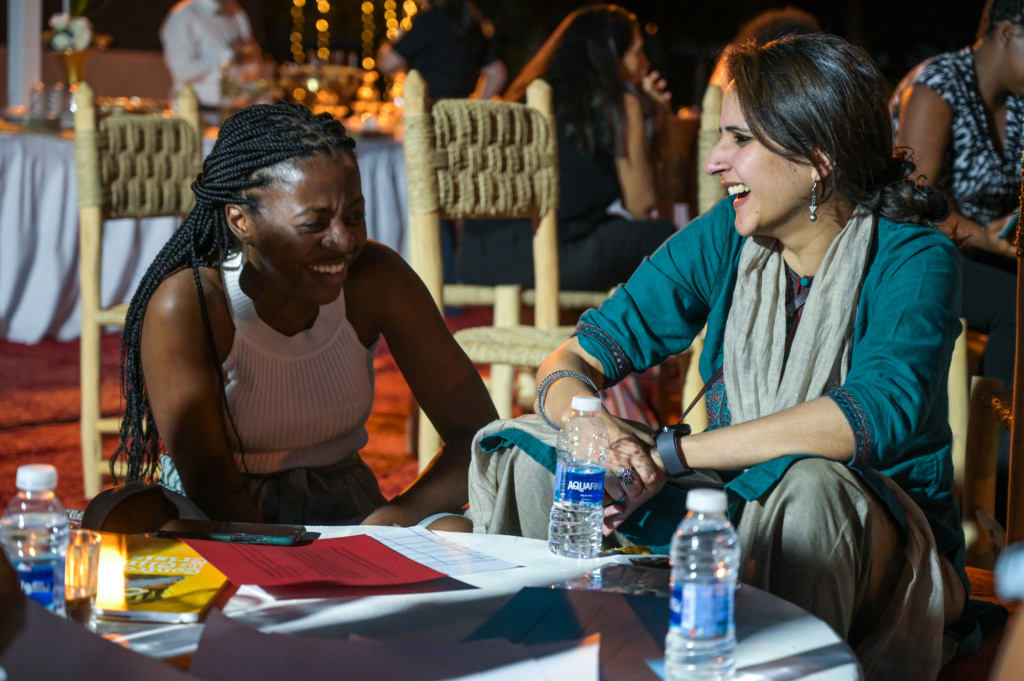join the movement
Women and girls around the world are demanding and creating systemic change and a sustainable future for all. We need collective power to attain a just future – we need you.
Economic Justice10 / 26 / 2023
From October 10-16, decision-makers gathered at the annual meetings of the International Monetary Fund (IMF) and World Bank in Marrakech, Morocco to discuss the global economy and next steps for the institutions. Alongside these “annuals,” the first to be held on the African continent since 1973, diverse coalitions of civil society, people’s movements, and feminists gathered to engage with the discussions, and, more importantly, to convene our own spaces to imagine alternative futures free from the austerity and debt finance instituted by the Bretton Woods Institutions (BWIs).
As we outline in our new brief, excerpted from our forthcoming report on Critical Trends Towards Economic and Climate Justice report, the colonial roots of the World Bank and IMF manifest in a one-dollar-one-vote, quota-based decision-making structure that severely limits resource access and decision-making power for Global South countries. And, their policy advice and loan conditionalities often impose strict austerity measures that reduce public spending, exacerbate debt, and undermine the role of the state.
These realities were challenged strongly in the civil society alternative spaces, particularly the End Austerity Festival and the Reclaim Our Future conference, both of which WEDO attended. But the official meetings focused on small-scale reforms, such as the inclusion of a chair for (all of) sub-Saharan Africa in the International Monetary and Finance Committee, and largely rhetorical proposals to make the BWIs compatible with “newer” pushes for gender and climate justice. Together with longstanding movements for economic justice, we contend that the IMF and World Bank cannot serve as agents towards gender, climate, or economic justice so long as they fail to interrogate where their own interventions are causing harm.
Our feminist agenda for economic and climate justice challenges the fundamental nature of the BWIs, and calls for redressing and transforming their role as a precondition to a more democratic and feminist global economic governance structure. In Marrakech, we were able to witness the decision-making and narrative-building around these processes—and to also challenge them by participating in protests and alternative spaces (outlined below).
As part of the Reclaim our Future Conference, WEDO co-led a roundtable discussion on Realizing Gender & Climate Justice: IMF Impediments and Alternatives, alongside event co-organizers ActionAid International, Akina Mama wa Afrika, Bretton Woods Project, Center for Economic and Social Rights, Gender Action, Kvinna Till Kvinna, and Oxfam. Speakers from the Center for Economic and Social Rights (Meghna Abraham), the Feminist Macroeconomic Alliance Malawi (Jessica Mandanda), Akina Mama wa Afrika (Faith Lumonya), and the Trade Collective (Lebohang Liepollo Pheko) pushed back against the IMF’s intended expansion into “resilience” and climate finance. The discussion raised concerns about false solutions such as carbon trading and a “just transition” trajectory that ignores energy needs of people in resource-rich countries in the global South. Instead, the speakers highlighted proposals to shift power, like progressive taxation and alternatives to GDP. Watch the ten-minute contribution of Lebohang Liepollo Pheko here.
Just preceding the start of the annual meetings, WEDO also co-organized a Feminist Gathering to connect with feminist activists from the MENA region and beyond over musical performances, refreshments, facilitated discussion, art, and more. This was an important space to decompress, listen to feminist testimony, and to identify potential ways forward for cross-movement, cross-regional advocacy on economic and gender justice. View the Flickr album.

Women and girls around the world are demanding and creating systemic change and a sustainable future for all. We need collective power to attain a just future – we need you.

